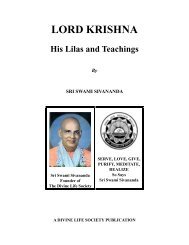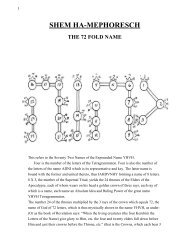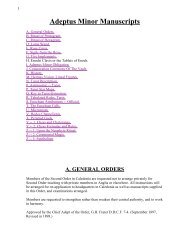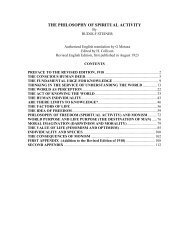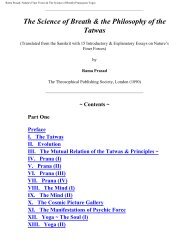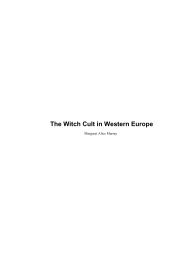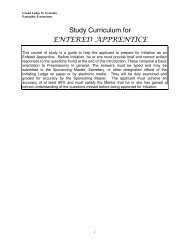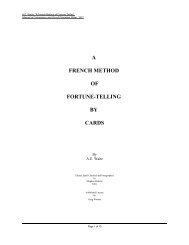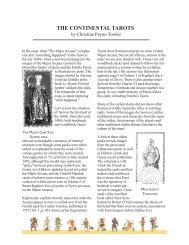Band 2 Anthropogenesis - H.P. Blavatsky
Band 2 Anthropogenesis - H.P. Blavatsky
Band 2 Anthropogenesis - H.P. Blavatsky
Create successful ePaper yourself
Turn your PDF publications into a flip-book with our unique Google optimized e-Paper software.
And here a short digression must be permitted and pardoned. In consequence of the last scholarly production of Mr.<br />
Gladstone in the Nineteenth Century, "The Greater Gods of Olympos," the ideas of the general public about Greek<br />
Mythology have been still further perverted and biassed. Homer is credited with an inner thought, which is regarded by<br />
Mr. Gladstone as "the true key to the Homeric conception," whereas this "key" was merely a blind. Poseidon "is indeed<br />
essentially of the earth earthy . . . . strong and self-asserting, sensual and intensely jealous and vindictive," -- but this is<br />
because he symbolises the Spirit of the Fourth Root-Race, the ruler of the Seas, that race which lives above the surface<br />
of the seas ([[limne]], Il. xxiv., 79), which is composed of the giants, the children of Eurymedon, the race which is the<br />
father of Polyphemus, the Titan and one-eyed Cyclops. Though Zeus reigns over the Fourth Race, it is Poseidon who<br />
rules, and who is the true key to the triad of the Kronid Brothers and to our human races. Poseidon and Nereus are one:<br />
the former the ruler or spirit of Atlantis before the beginning of its submersion, the latter, after. Neptune is the titanic<br />
strength of the living race; Nereus, its spirit reincarnated in the subsequent Fifth or Aryan Race: and this is what the great<br />
Greek scholar of England has not yet discovered, or even dimly perceived. And yet he makes many observations upon<br />
the "artfulness" of Homer, who never names Nereus, at whose designation we arrive . . . . only through the patronymic of<br />
the Nereids!<br />
Thus the tendency of even the most erudite Hellenists is to confine their speculations to the exoteric images of mythology<br />
and to lose sight of their inner meaning: and it is remarkably illustrated in the case of the Right Hon. W. E. Gladstone, as<br />
we have shown. While almost the most conspicuous figure of our age as a statesman, he is at the same time one of the<br />
most cultured scholars England has given birth to. Grecian literature has been the loving study of his life, and he has<br />
found time amid the bustle of public affairs to enrich contemporary literature with contributions to Greek scholarship which<br />
will make his name famous through coming generations. At the same time, as his sincere<br />
[[Footnote(s)]] -------------------------------------------------<br />
* See Matsya Purana, which places him among the seven Prajapatis of the period.<br />
------------------------------------------------------------------------<br />
[[Vol. 2, Page]] 767 THE POWER OF NAMES.<br />
admirer, the present writer cannot but feel a deep regret that posterity, while acknowledging his profound erudition and<br />
splendid culture, will yet, in the greater light which must then shine upon the whole question of symbolism and mythology,<br />
judge that he has failed to grasp the spirit of the religious system which he has often criticised from the dogmatic Christian<br />
standpoint. In that future day it will be perceived that the esoteric key to the mysteries of the Christian as well as of the<br />
Grecian theogonies and Sciences, is the Secret Doctrine of the pre-historic nations, which, along with others, he has<br />
denied. It is that Doctrine alone which can trace the kinship of all human religious speculations or even so-called<br />
Revelations, and it is this teaching which infuses the Spirit of life into the lay figures on the Mounts of Meru, Olympus,<br />
Walhalla, or Sinai. If Mr. Gladstone were a younger man, his admirers might hope that his scholastic studies would be<br />
crowned by the discovery of this underlying truth. As it is, he but wastes the golden hours of his declining years in futile<br />
disputations with that giant free-thinker, Col. Ingersoll, each fighting with the weapons of exoteric temper, drawn from the<br />
arsenals of ignorant LITERALISM. These two great controversialists are equally blind to the true esoteric meaning of the<br />
texts which they hurl at each other's head like iron bullets, while the world alone suffers by such controversies: since the<br />
one helps to strengthen the ranks of materialism, and the other those of blind Sectarianism and of the dead letter. And<br />
now we may return once more to our immediate subject.<br />
Many a time Atlantis is spoken of under another name, one unknown to our commentators. The power of names is great,<br />
and was known since the first men were instructed by the divine masters. And as Solon had studied it, he translated the<br />
"Atlantean" names into names devised by himself. In connection with the continent of Atlantis, it is desirable to bear in<br />
mind that the accounts which have come down to us from the old Greek writers contain a confusion of statements, some<br />
referring to the Great Continent and others to the last small island of Poseidonis. It has become customary to take them<br />
all as referring to the latter only, but that this is incorrect is evident from the incompatibility of the various statements as to<br />
the size, etc., of "Atlantis."<br />
Thus, in the Timaeus and Critias, Plato says, that the plain surrounding the city was itself surrounded by mountain chains.<br />
. . . . And the plain was smooth and level, and of an oblong shape, lying north and south, three thousand stadia in one<br />
direction and two thousand in the other. . . . . They surrounded the plain by an enormous canal or dike, 101 feet deep,<br />
606 feet broad, and 1,250 miles in length.<br />
Now in other places the entire size of the island of Poseidonis is given as about the same as that assigned here to the<br />
"plain around the<br />
------------------------------------------------------------------------<br />
[[Vol. 2, Page]] 768 THE SECRET DOCTRINE.<br />
city" alone. Obviously, one set of statements refers to the great continent, and the other to its last remnant -- Plato's<br />
island.<br />
And, again, the standing army of Atlantis is given as upwards of a million men; its navy as 1,200 ships and 240,000 men.<br />
Such statements are quite inapplicable to a small island state, of about the size of Ireland!<br />
The Greek allegories give to Atlas, or Atlantis, seven daughters (seven sub-races), whose respective names are Maia,<br />
Electra, Taygeta, Asterope, Merope, Alcyone, and Celaeno. This ethnologically, as they are credited with having married<br />
gods and with having become the mothers of famous heroes, the founders of many nations and cities. Astronomically, the<br />
Atlantides have become the seven Pleiades (?). In occult science the two are connected with the destinies of nations,<br />
those destinies being shaped by the past events of their early lives according to Karmic law.<br />
Three great nations claimed in antiquity a direct descent from the kingdom of Saturn or Lemuria (confused already<br />
several thousands of years before our era with Atlantis): and these were the Egyptians, the Phoenicians (Vide<br />
Sanchoniathon), and the old Greeks (Vide Diodorus, after Plato). But the oldest civilized country of Asia -- India -- can be



